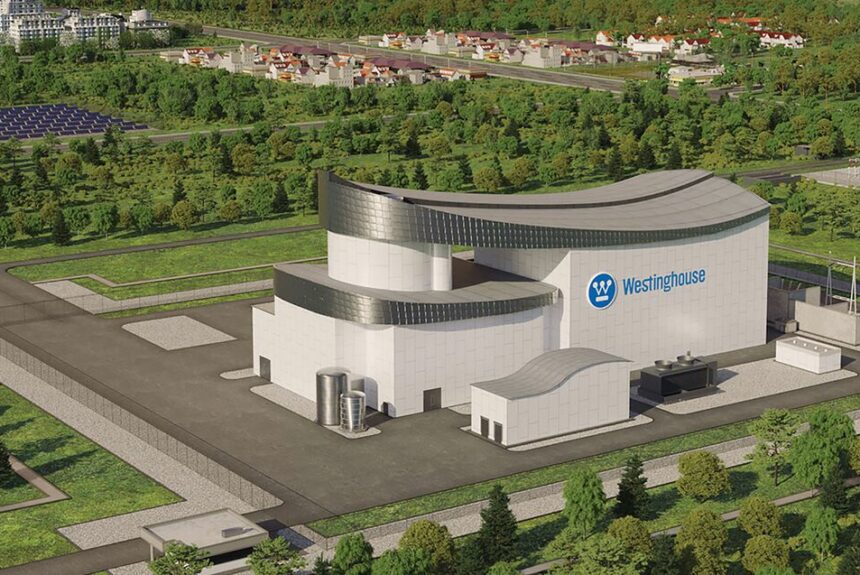In an era of rapidly evolving technology and growing demand for clean and affordable power, significant progress is being made in the field of advanced nuclear reactor technology. Small modular reactors, commonly known as SMRs, offer a practical and innovative approach to meeting our energy demands while reducing carbon emissions and putting America at the forefront of global energy leadership.
>>>READ: Five of the World’s Leading Small Modular Reactor Companies
SMRs are often characterized as nuclear reactors that have a power output of 300 MWe or smaller. Many SMRs are designed for modular construction and factory fabrication which lowers operational and construction costs and also allows for flexible deployment, especially in rural and remote areas. SMRs also promise enhanced safety features that, in many cases, make a plant meltdown virtually impossible.
The private sector is making impressive strides to advance SMR technology. Most recently, Westinghouse announced that it is developing an SMR while GE Hitachi has recently agreed to build its BMRX-300 in Ontario and Tennessee. These two developments are poised to pave the way for future development in the nuclear space, in addition to the worldwide support around SMRs.
Another promising SMR project underway in the United States comes from NuScale Power, where they have developed an innovative SMR design that features a 60 MWe module capable of producing 924 MWe when combined in a 12-module power plant. Their passive safety systems, combined with a smaller environmental footprint, make this design an attractive option for utility companies seeking clean, reliable power generation.
In January NuScale’s SMR became the first design to receive certification from the Nuclear Regulatory Commission (NRC). While an important first step in bringing the technology closer to commercialization, the process to receive approval was onerous and expensive for NuScale and has slowed down SMR developments in the U.S. NuScale is also bolstering European energy security by installing an SMR in Romania, a step in the right direction in reducing the continent’s dependence on Russian gas.
The United States has been successful in forging strong public-private partnerships to promote the development of SMRs. In 2020, the U.S. Department of Energy launched the Advanced Reactor Demonstration Program (ARDP) to support the demonstration of advanced reactors, including SMRs, by providing funding and technical assistance. DOE has also awarded a $1.4 billion grant to a partnership between Utah Associated Municipal Power Systems (UAMPS) and NuScale Power to build the Carbon Free Power Project. This project will deploy six 77-megawatt reactors to replace aging coal plants throughout Utah, Idaho, and Colorado. These partnerships not only foster innovation but also pave the way for broader adoption of SMRs in the energy market.
>>>READ: The World is Ready for Advanced Nuclear Power, New Polling Finds
While these advancements in the U.S. are encouraging, regulatory challenges remain. The licensing process at the Nuclear Regulatory Commission (NRC) is complicated and expensive for developers to navigate, which hamstrings innovation. In 2019, Congress passed the Nuclear Energy Innovation and Modernization Act (NEIMA) which directed the NRC to develop a regulatory pathway to streamline licensing for advanced reactors. Late last year, the NRC staff released its proposed rulemaking which is arguably worse than the current regulations that are stifling progress. The proposed rule’s page count is twice as long as what is currently in law and reinforces unnecessarily burdensome radiation standards that drive up operational costs for no public health benefits. While the NRC has yet to release a finalized rule, Congress must ensure that the Commission follows NEIMA’s mandate and implement an efficient pathway to deploy advanced nuclear power in the U.S.
SMR innovation is happening around the world, not exclusively in North America.
Rolls-Royce is investing heavily in the SMR and micro-reactor space. The UK government has committed more than $300 million towards SMR research and development, signaling its confidence in the technology’s potential. The British company has introduced a design aimed to produce 440 MWe per unit which can be deployed in a variety of scenarios, including grid supply, industrial use and remote locations.
In addition to their pending approval to launch a reactor in 2028, NuScale announced in early May that it is looking to deploy six SMRs in South Korea, potentially powering a little less than one million households. Poland has also signed agreements with NuScale and Next Energy to deploy SMRs in the country in the 2030s.
Small modular reactors represent a pragmatic and innovative solution to addressing the world’s energy demands while combating climate change and demonstrate a growing global commitment to embracing this technology. As we navigate the challenges of the 21st century, it is crucial that we continue to invest in and develop SMRs to ensure a cleaner, more sustainable future.
Jorge Velasco is a student at George Mason University’s Schar School of Policy and Government. Follow him on Twitter @velascoAjorge.
The views and opinions expressed are those of the author’s and do not necessarily reflect the official policy or position of C3.
